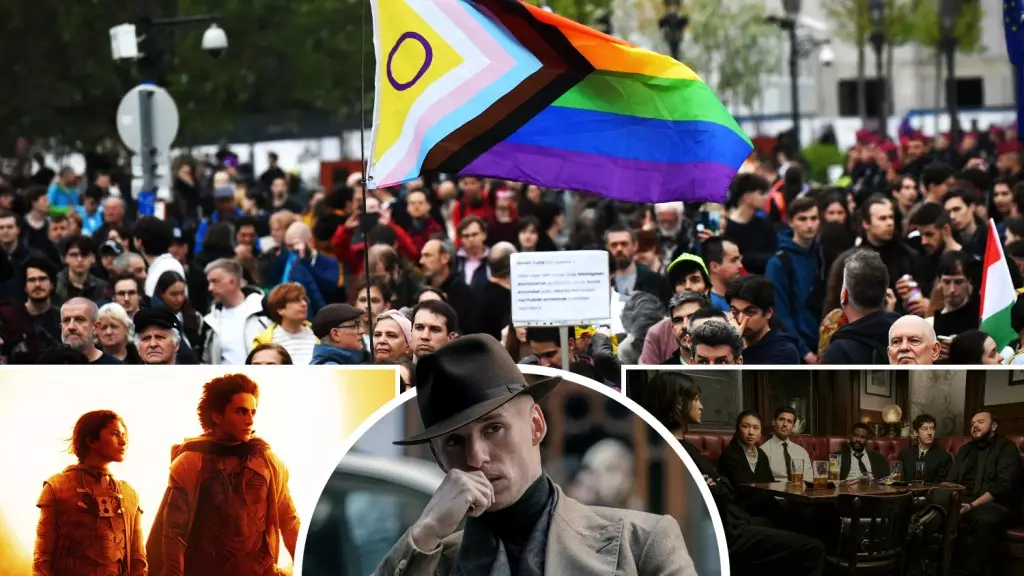The recent strides in civil rights have afforded many marginalized communities an opportunity for greater acceptance and representation. However, this progress is now threatened by resurgent anti-LGBTQ sentiment, particularly exemplified by Hungary’s recently enacted legislation. The Hungarian parliamentary coalition, led by Prime Minister Viktor Orbán, has advanced a series of laws targeting the LGBTQ community, raising the question of how artistic sectors, such as Hollywood, will respond. The tension between financial considerations and ethical imperatives is palpable; it echoes a similar historical incident when Hollywood withdrew from North Carolina over its controversial HB 2, which restricted the rights of transgender individuals.
This raises a critical juncture for Hollywood: should film productions maintain operations in locations where such oppressive laws are codified? Hungary has become a prominent center for filmmaking, yet the implications of continuing to film in a country with such constitutional changes beg further introspection and discussion.
Financial Temptation versus Moral Responsibility
As an attractive destination for film production, Hungary offers competitive tax incentives—approximately 30% on qualified expenditures—alongside a skilled local workforce. These factors render it alluring for studios keen on maximizing their budget efficiently. However, the question of whether these benefits justify turning a blind eye to significant ethical violations looms large. Less than a decade ago, industries effectively sidelined North Carolina’s production capabilities in reaction to similar legislative misconduct. Still, despite the ongoing discussions surrounding Hungary’s increasingly hostile environment for LGBTQ rights, major studios appear reluctant to pull out.
The decision to remain operationally present in Hungary amidst these new regulations indicates a troubling precedent. Not only does it suggest a prioritization of profit over principled action, but it also creates a concerning context where monetary gain supersedes the obligation to stand against bigotry. Hollywood’s historic boycott of North Carolina was framed around hope for change; in stark contrast, Hungary’s political climate presents a significantly less optimistic landscape, haunted by Orbán’s authoritarian ecosystem.
Why Silence Speaks Volumes
The lack of immediate vocal dissent from industry players regarding Hungary’s anti-LGBTQ stance is especially telling. Unlike the robust public outcry witnessed in North Carolina, Hollywood’s muted response in this instance reflects a wish to avoid economic repercussions despite the enormous ethical stakes. Major productions like “Dune: Part Two” and the HBO series “Dune: Prophecy” are not only pivotal points in cinematic storytelling but also key economic drivers for their respective studios.
While it’s easy for Hollywood to rationalize this silence in terms of current contractual obligations and investments, opting for inaction, especially in the face of profound human rights violations, undermines the very principles the industry purports to champion. Can a community grounded in innovation and creativity truly distance itself from unethical practices without severe ramifications? Inaction can be as powerful as action, shaping societal norms and expectations.
The Potential Repercussions for Local Crews and Talent
The muted Hollywood response also carries a weighty human cost, impacting local talent and crews who depend on the film industry for their livelihood. Producers have acknowledged the distress expressed by Hungarian workers who fear their jobs will dwindle as international productions waver. There exists a fragile ecosystem in Hungary—one that nurtures artistic endeavors while cultivating a skilled workforce. Would the ongoing neglect of ethical considerations by Hollywood lead to a deterioration of this ecosystem, where opportunities diminish not only for the local population but also for future creatives who envision a more inclusive artistic space?
Moreover, the prospect of Hollywood talent refusing to work in Hungary due to its legislative stances raises concern over the long-term implications for projects in the region. If Hollywood continues to overlook these legislative transgressions, it could provoke a chilling effect, silencing voices of those who wish to stand up against oppression on both national and international stages.
A Broader Reflection on Global LGBTQ Advocacy
In broader terms, Hungary serves as a microcosm of a global struggle, where LGBTQ rights are under threat from authoritarian regimes and regressive policies. Not only are U.S. cultural industries questioned about their actions regarding Hungary, but they are also forced to confront their own domestic trajectory concerning civil liberties. The parallels between the legislative moves in Hungary and similar actions in the United States prompt introspection about the extent to which Hollywood can and should actively participate in advocacy, especially when their creative endeavors are implicated within this geopolitical context.
The challenge lies not merely in what individual studios choose to do; rather, it exists in the embrace of a collective responsibility to stand against degradation of civil rights and to showcase a united front for equity and inclusivity across the globe. Balancing moral activism against economic viability remains a thorny dilemma, with significant implications for the creative landscape if Hollywood does not heed the signs of the times.
